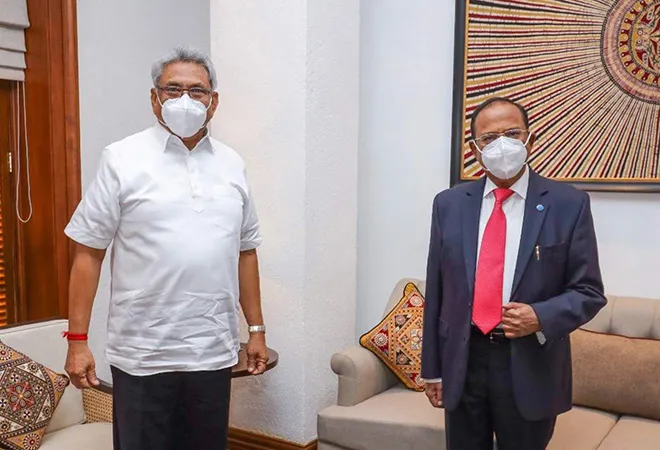-
CENTRES
Progammes & Centres
Location
“With improved implementation of the plan of action for South Asia, Trump has impelled the region to constantly recalibrate strategic choices while ensuring that US interests endure, even as ‘transactionalism’ remains the core”

Many analysts describe US President Donald Trump’s foreign policies as “transactional” in nature: resulting in multilateral equations based on personal diplomacy, rather than forward-looking geostrategic imperatives. It is noteworthy, therefore, that Trump’s stated policy objectives vis-à-vis South Asia have been characterised by continuity rather than change, when compared with previous US administrations. Still, while the larger strategic objectives may be holding up a mirror to past US discourses in South Asia, the tools employed to achieve them have been different and disruptive in many ways.
The earliest and most visible manifestation of the US’ rigorous appraisal of regional dynamics was perhaps Trump’s South Asia Strategy that focused on ending the war in Afghanistan, while staying cognisant of the potentially dire consequences of a hasty exit amidst emboldened militancy. The new approach provided for increased devolution of decision-making powers to the military, in order to more efficiently tackle terror groups operating in the region. It also made troop withdrawal contingent upon the fulfilment of certain conditions on the ground, instead of being a time-bound exercise, in an effort to compel the insurgents to agree to engage in negotiations to end the conflict.
Against this background, the historic US-Taliban deal and initiation of intra-Afghan talks, after much contention over the issue of prisoner release, marked a clear success for Trump. At the same time, the deal raised serious concerns within the Afghan government, vis-à-vis the possibility of the Taliban regaining political power, and a potentially compromised republic in the future. Moreover, the deal compelled a recalibration of strategic postures amongst key regional stakeholders, particularly in the immediate neighbourhood.
Given Pakistan’s geographically strategic location and influence over the Taliban, the country’s importance in US efforts to stabilise Afghanistan, was not lost on anyone in Washington, even before Trump came to office.
Given Pakistan’s geographically strategic location and influence over the Taliban, the country’s importance in US efforts to stabilise Afghanistan, was not lost on anyone in Washington, even before Trump came to office. Arguably, it is for that reason that Trump’s predecessors chose to overlook Pakistan’s disruptive role in Afghanistan, in favour of using Pakistani territory to supply reinforcements to the US troops in Afghanistan. Trump, on the other hand, departed from convention by imposing military aid cuts on Pakistan, citing the lack of action by Islamabad in dismantling terror camps within its territory. However, even Trump proved incapable of wishing away the importance of Pakistan in the US’ strategic calculus; soon after revoking significant aid to Pakistan, he began to pursue a reset in US-Pak ties – much to India’s dismay.
Another move that threatened to disrupt existing regional dynamics was Trump’s decision to explicitly call upon India to play a bigger role in Afghanistan – a move that Washington had previously refrained from, apprehensive of offending Pakistan’s political sensibilities. India, looking for ways to combat Pakistan’s efforts at sabotaging Indian presence in Afghanistan, welcomed Trump’s invitation to deepen engagement with Afghanistan. While strategic ties between India and the US have progressively strengthened since, economic relations have remained strained, as divergent economic priorities have often threatened to undermine strategic convergences. However, despite underwhelming economic ties and Trump’s unwelcome propositions to mediate on Kashmir, New Delhi has remained firm on its commitment to its strategic partnership with the US – a relationship that continues to be central to the US’ strategic objectives in South Asia as well.
The views expressed above belong to the author(s). ORF research and analyses now available on Telegram! Click here to access our curated content — blogs, longforms and interviews.

Shubhangi Pandey was a Junior Fellow with the Strategic Studies Programme at Observer Research Foundation. Her research focuses on Afghanistan particularly exploring internal political dynamics ...
Read More +